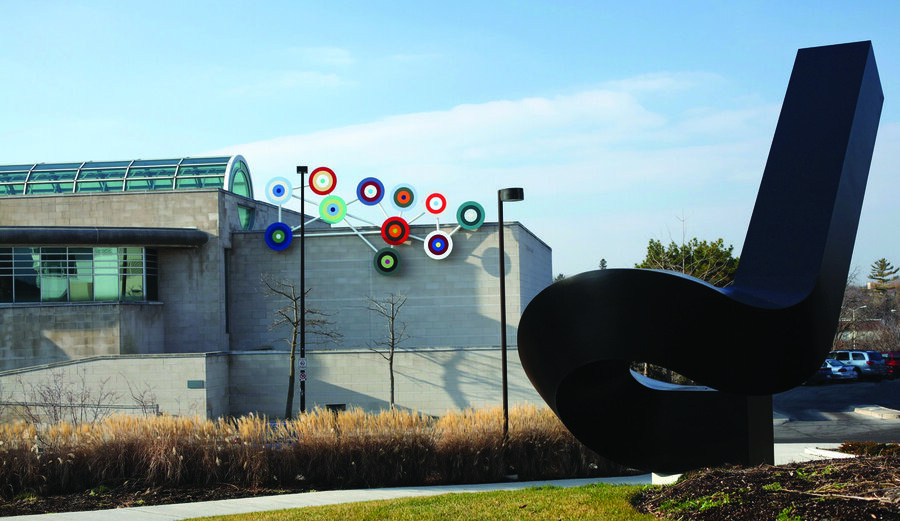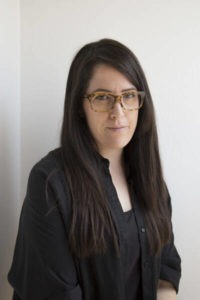“So many people have turned to the arts during the pandemic,” Gould says, “whether it be Netflix, online exhibitions like ours, or reading more books. There’s never been a better testament to how it improves our wellbeing..."

The Robert McLaughlin Gallery has been looking forward and outward for some years. The inside and outside of the gallery have blurred somewhat with the installations of public art sculptures throughout downtown Oshawa. The celebratory “Group Portrait 1957” by Douglas Coupland—pinned like a medal of honour to the facade of the building—the swaggering “Upstart II” by Clement Meadmore, and the remarkable “Reverb” by Noel Harding, are just a few of the sculptures one can enjoy safely outside. Consider a walking tour of the pieces at different times of the day to see how the light changes the experience of these treasures.

It is not, however, just strategic planners at the gallery whose sights are set on what is ahead. The curators, too, have been almost oracular in their exhibition presentations in recent years.

Leila Timmins, Curator & Manager, Exhibitions and Collections, gives credit to her colleague, Sonya Jones, RMG’s Curator of Collections, for two eerily prescient exhibitions in 2018.
“The first, called ‘The Forgotten Epidemic,’ shared historical photographs from the Thomas Bouckley Collection that looked at the impacts of the Spanish Influenza on Durham Region. I remember talking to many gallery visitors who had never heard of the Spanish Influenza, and were shocked to see the images of factory workers and farmers in masks. It feels strange thinking back to our shared ignorance of what was to come. The second exhibition was called ‘Public Notice,’ which brought together works by seven artists—each responding to a different pandemic or global health crisis, such as SARS, Ebola and AIDS. I remember one of the most powerful underlying messages of that exhibition was that as deadly as each of the diseases are, the human impacts of the prejudice, fear, and xenophobia that can emerge during a crisis can be equally, if not more, harmful,” Timmins says.
There are lessons to be learned from the artists; art can inform and educate, and prepare us for what may be beyond the horizon.
“While I can’t think of a specific artwork that predicted the type of world we are currently living in, over the past few years, I have noticed that “care” has been a recurring theme for artists and programming,” says Timmins. “I imagine this focus will continue as we figure out new ways of being together and supporting each other over the coming months. I find that artists are often attuned to what we need, and I think more than ever what we need is collectivity, and ways to come together.”
Collectivity and connectivity are the underpinnings of the Gallery’s approach to COVID-19. After closing its doors to the public in March 2020, the RMG joined the evocatively named Field Trip, an online arts community.
“Our team was really excited by the opportunity to be a part of Field Trip for various reasons: It was an opportunity to connect with and be a part of a network of art museums across the country, in a shared effort to provide quality programming to our audiences; share great digital programming created by other art museums through our channels; provide our community with access to quality digital programming from other great art museums; and, it was an innovative way for us to continue our mandate to support artists locally and nationally,” says Ingrid Forster, lead for Communications and Digital Media.
Even with the foresight granted to us by our sage local and national artists, none can say for sure what 2021 will churn up. While the future is unknown, it’s never been so unknown. To that end, it’s to RMG CEO Lauren Gould we turn to for some semblance of certainty, at least in terms of what is being set in motion for the institution.
What exists and will continue to exist is a focus on both online and in-person engagement with exhibitions. Since reopening in July 2020, the Gallery’s prioritization of the health and safety of staff, volunteers and visitors enabled people inside to once again engage and experience the exhibitions.

“We’ve balanced this with a huge push towards increased digital engagement,” says Gould. “By the first week of April 2020, we’d launched Virtual RMG to engage people in our collections and exhibitions, through hands-on art activities, live public programming and digital publications. We very much see this as something that will continue to 2021 and beyond as we’ve long wanted to build that digital muscle.”
Muscle builds on repetition. Hopefully, the world will not have to ever repeat another year like 2020, but should it become so, muscle memory will be familiar with the response required.
“We have done so many things for the first time this year,” says Gould. “Each time we learn and improve, and as a result, hopefully, serve the community better. We don’t anticipate returning to in-person events until late 2021, but will continue to support artists and creators through on-site exhibitions when we’re once again able to open safely.”
Gould also echoes Timmins’ observation on how “care” has become somewhat of a touchstone in the art world.
“So many people have turned to the arts during the pandemic,” Gould says, “whether it be Netflix, online exhibitions like ours, or reading more books. There’s never been a better testament to how it improves our wellbeing and connection to others.”
And when better to prioritize your own wellbeing than right now, during this pandemic.
NOTE: At the time of publishing, Durham Region is in a province-wide shutdown with extensive measures in place to stop the spread of COVID-19. Residents are encouraged to stay at home with exception to essential trips, wash hands frequently, wear a mask and physically distance from others.
We continue to publish these stories to encourage you to explore these businesses and communities online and through social media. When possible, please order for safe curbside pick-up if offered, and prepare to explore these areas once they are able to safely reopen.
